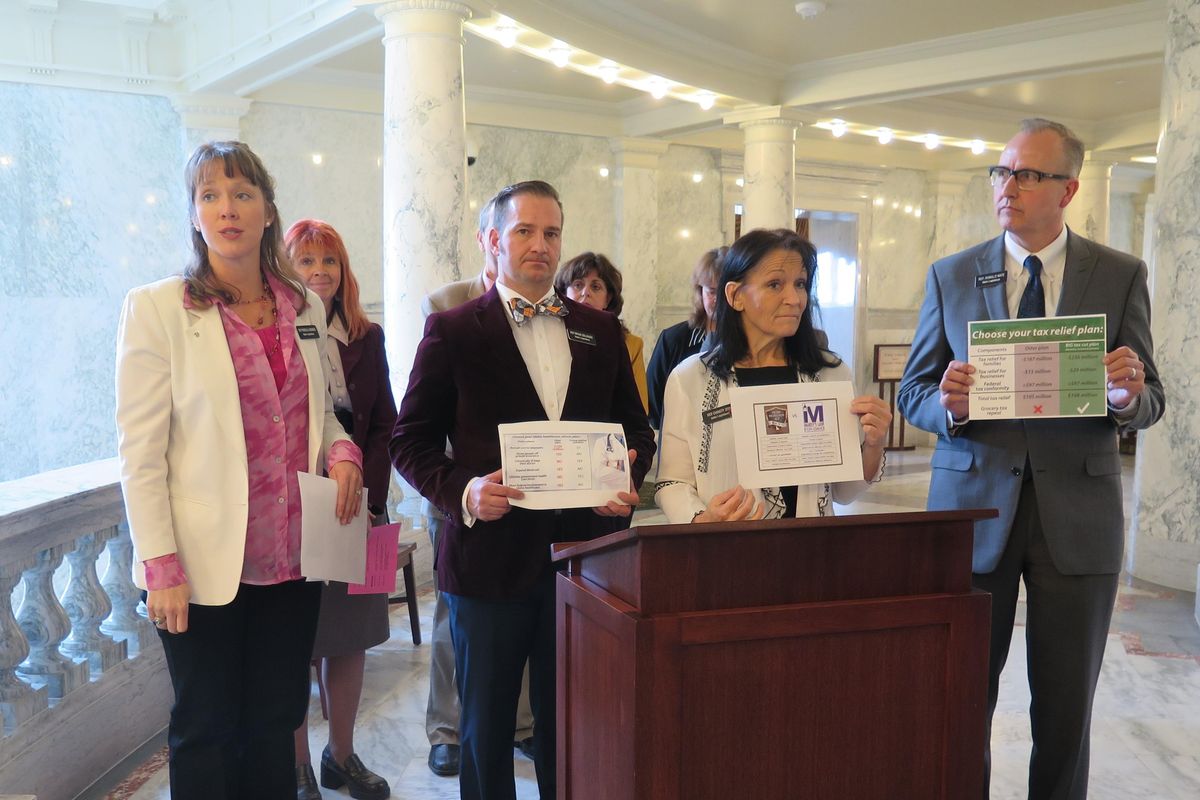This column reflects the opinion of the writer. Learn about the differences between a news story and an opinion column.
Eye on Boise: Lawmakers say they want to ease state licensing rules

More than a dozen GOP lawmakers announced last week that they’re forming a “Regulatory Reform Joint Subcommittee” to examine the rules and regulations of state occupational licensing boards and look for ways to streamline them.
The panel, to be co-chaired by Rep. Gayann DeMordaunt, R-Eagle, and Sen. Todd Lakey, R-Nampa, will be a subcommittee of the House Business Committee and the Senate Commerce Committee.
Rep. Vito Barbieri, R-Dalton Gardens, the House Business chairman, said he hopes the group can help with “streamlining rules and regulations with regards to licensing, eliminating rules and regulations with regards to licensing, and of course looking at the regulations to make sure that they’re not anti-competitive.”
He and Sen. Jim Patrick, R-Twin Falls, the Senate Commerce chair, said the panel will consist of three majority members and one minority member from each house’s committee, and will invite state regulatory boards to appear before it to detail the licensing rules and regulations specific to each industry.
DeMordaunt cited a Cato Institute report that found that nationally, just 5 percent of U.S. jobs required licensing in 1950, but 30 percent do today.
House GOP Caucus Chairman John VanderWoude, R-Nampa, said, “Most of the time, we’ve waited ‘til an interim committee” to launch a legislative study panel. “We’re all here, so I think it’s an excellent opportunity to get that subcommittee started. It gives it a lot more push to move forward.”
DeMordaunt said, “I think it speaks to the seriousness with which we’re addressing the issue.”
They’re not the only ones. Last May, while serving as acting governor while Gov. Butch Otter was out of state, Lt. Gov. Brad Little signed an executive order to launch a review of Idaho’s occupational licensing requirements, after a big legislative fight in 2017 over changes to cosmetology licensing resulted in a bill that ended up being vetoed by Otter.
“To my knowledge, we have never reviewed many of these licenses,” Little said then. “From this last legislative session, it’s clear that we need to take a comprehensive look at our practices, and how and why they were implemented.”
Little, who is running for governor this year, titled his executive order the “Licensing Freedom Act.” Under it, state agencies are required to submit a report to the governor’s office by July 1, assessing whether existing occupational licensing requirements are necessary and in the public interest, and also addressing recommendations for improvement, modification or elimination.
Asked about that, DeMordaunt called the legislative move “complementary to the effort – it’s the Legislature’s approach to that.” Barbieri said the panel will engage directly with licensing boards, “rather than just a report.”
The Idaho Freedom Foundation has made objections to occupational licensing rules in Idaho a centerpiece of its agenda, downgrading lawmakers in its “Freedom Index” scores for them if they support increases in occupational licensing rules of any type or oppose rollbacks in those rules.
For example, the group is rating HB 457, a bill proposed this year by the Idaho Real Estate Commission to require licensed real estate agents to complete a required continuing education course within six months of their initial licensing, rather than the current requirement of two years, a “minus-2” on its “Freedom Index.”
The commission said completion of the course is “essential to ensure licensees possess the knowledge, skills, and competency necessary to function in the real estate business.”
The Freedom Foundation, in its analysis for its index, said, “Pushing up this requirement would restrict the options available to licensees.”
‘Liberty legislators’
A dozen GOP lawmakers who’ve dubbed themselves “liberty legislators” gathered in the Capitol rotunda Friday to announce they’re pushing forward with their own versions of three GOP-backed bills already moving through the Legislature: The governor’s income tax-cut bill; the “Marsy’s Law” victim’s rights amendment to the Idaho Constitution; and the Idaho Health Care Plan.
“There really are options, and we hope that these options will get an equal opportunity in upcoming committee hearings,” said Rep. Priscilla Giddings, R-White Bird.
Barbieri, R-Dalton Gardens, plans to propose an alternative tax-cut bill on Monday that will couple the provisions of the governor’s income tax-cut bill with a repeal of the sales tax on groceries. Rep. Ron Nate, R-Rexburg, said the group is calling it the “BIG Tax Relief Plan,” with “BIG” standing for “business, income and grocery.” Nate derided the governor’s bill as a “little tax relief plan.”
Asked why all 12 of the assembled legislators voted in favor of the governor’s bill in Wednesday’s House vote, Rep. Bryan Zollinger, R-Idaho Falls, said, “It’s still a good tax bill, it gives relief to Idaho families. We just want it to be better.”
On victims’ rights, Rep. Christy Zito, R-Hammett, said she hopes to propose legislation to add protections for the rights of crime victims without changing the Idaho Constitution, while protecting the rights of the accused.
On health care, Zollinger said he’s proposing legislation to codify the proposals in the governor’s executive order allowing insurance plans that don’t comply with Affordable Care Act rules to be sold in Idaho, and to both impose work requirements and boot able-bodied Idahoans off Medicaid after a lifetime limit of five years.
His measure wouldn’t address any of the provisions in Otter’s proposed Idaho Health Care Plan, which would seek federal waivers to allow 35,000 Idahoans who now fall into a coverage gap to qualify for subsidized insurance through the state insurance exchange.
Zollinger said he’s been promised that if the Idaho Health Care Plan is killed in the full House next week, his bill will get a committee hearing.
